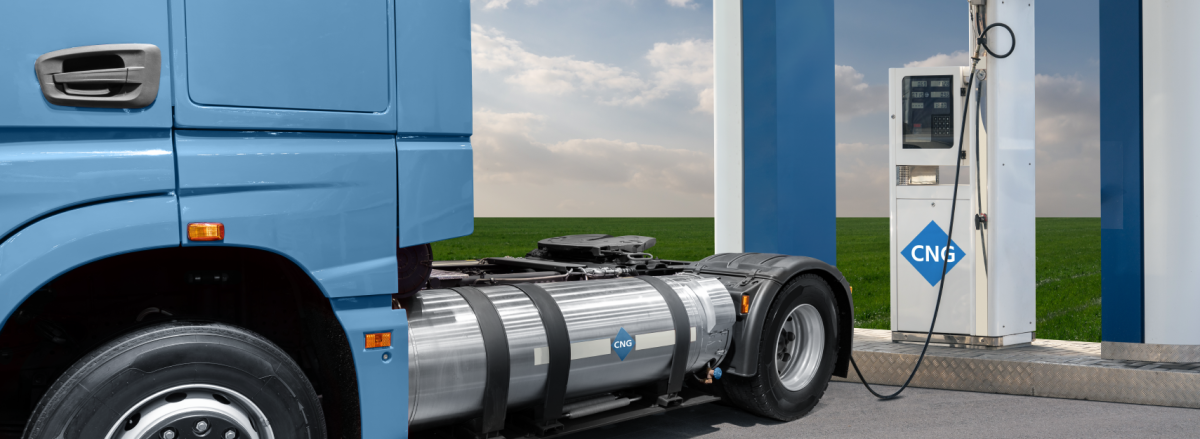As fuel and lubricant prices rise, more companies are looking for alternative ways to reduce fueling costs, especially in the heavy-duty market. This market relies on powerful engines to haul materials over long distances. Heavy-duty trucks and equipment represent a significant investment for many companies, so switching to new engines or alternative fuel sources is a considerable discussion for small businesses. Now in the current market, many companies are seriously considering new machinery and technology to reduce their fuel and lubricant costs, and one alternative is compressed natural gas (CNG).
Natural gas is not a new fuel alternative. It’s been around for quite some time, but many businesses and fleet managers were wary of making the change, especially for compressed natural gas (CNG). But that’s all started to change recently, and CNG-compatible engines are becoming more common in the heavy-duty market. New engine designs and technology make CNG engines much more compatible, efficient and powerful than they used to be. Cummins, the leading manufacturer of natural gas engines, has been making CNG engines for years. In October 2021, they introduced a 15-liter natural gas engine, the Cummins CES 20092, as powerful as other heavy-duty engines for on-highway, long-haul applications. But it weighs 500 pounds less and doesn’t need exhaust filtration.
What is Compressed Natural Gas?
Cummin’s heavy-duty natural gas and CNG engines show that this technology can deliver the power the heavy-duty market needs. But what other advantages come with using CNG fuel? Let’s explore this.
Natural gas accounts for 30% of the energy use in the United States. It’s typically used for residential heating, cooking or commercial and industrial purposes. So far, less than 1% of the total natural gas used in the country is used for transportation. That’s a shame, but natural gas is a fantastic fuel. It’s clean burning and provides compatible energy density to gasoline and diesel. The two most used types of natural gas are liquefied natural gas (LNG) and Compressed Natural Gas (CNG).
CNG-compatible vehicles store natural gas in a gaseous state under pressure, kind of like the propane tanks you use for BBQs. Many business owners and manufacturers prefer LNG capability vehicles because they can store more fuel in the tank and are more energy dense. But as Cummin’s new engine shows, CNG technology is changing, and new engines are being designed with CNG capabilities that provide the same power. So what are some of the other advantages of CNG?
- It’s cleaner. CNG fuel burns cleaner than gasoline or diesel and reduces emissions significantly. You also don’t have to use after-market additives or emissions controls since it’s so clean.
- It’s cheaper. CNG fuel is much cheaper than gasoline or diesel fuels. Some businesses can almost cut their fuel budget in half when they make the switch.
- It’s better for maintenance. CNG fuels do not produce residues like gasoline or diesel, so you don’t have to worry about sulfur, particulates, heavy metals or other toxins contaminating your engine oil or lubricants.
- It’s quieter. CNG engines run quieter and cleaner, so it’s safer for your employee’s hearing and cleaner in your shop!
Do CNG engines need lubrication?
Even though CNG fuel is gaseous, CNG-compatible engines still require lubrication, and they have specific lubrication needs compared to other heavy-duty engines. A CNG engine starts with spark ignition via spark plugs, which means it’s a little slower to ignite than diesel. Compatible engine oils must be able to withstand low-speed pre-ignition or LSPI. The specifications for the Cummins CES 20092 call for engine oil that can withstand LPSI as well as reduce deposit formation in the combustion chamber. They also recommend choosing an engine oil with low ash levels and improved oxidation and nitration performance since these engines have extended drain intervals compared to similar diesel engines.
Use Delo® 400 SNG SAE 15W-40
So which engine oil do we recommend for CNG engines? Chevron’s Delo® 400 SNG SAE 15W-40. This engine is designed for heavy-duty protection for various CNG and LNG vehicles with spark-ignition mobile engines. Designed by Chevron, this oil is cleaner and better for your CNG engines. It’s ISOSYN® certified, so it’s cleaner than other leading brands, and it provides some excellent benefits, including:
- Improved engine cleanliness to reduce sludge control and piston deposits
- Increased oil oxidation/nitration control for extended service intervals
- Low wear protection and extended oil drain protection
It’s a highly versatile engine oil, and you can use it in:
- LNG/CNG Linehaul Truck Service
- LNG/CNG Delivery Truck Service
- LNG/CNG Waste Truck Service
- LNG/CNG Cement Truck Service
- CNG Municipal Bus Service
- Light Duty DNG Pick Up Trucks
And more CNG engine types such as:
- Cummins ISL G (8.9L)
- Cummins ISX12 G
- Cummins L9 N
- Detroit Diesel Series 50G
- Detroit Diesel Series 60G
Let us help you make the switch to CNG
CNG technology will become more popular as more businesses grapple with rising fuel costs and look for ways to reduce their emissions. We’re excited to see the innovative ways manufacturers like Cummins are utilizing CNG fuel to power heavy-duty trucks and machinery. As a fuel and lubricant supplier, we’re here to help our clients like you find the fuel and lubricant supplies that you need for your fleet. If your fleet expands to include CNG-compatible engines, we’re here to support you with the proper lubricant and fuel supplies.
The future of heavy-duty transportation is changing to become cleaner and more efficient. CNG fuel is just one of the many ways the industry adapts to the changing market. If you have questions about other fuel or lubricant alternatives or supplies for your heavy-duty equipment, call Greg’s Petroleum Supply representative today. As a Valvoline Lubricants Supplier and Chevron Lubricants Supplier, we’re always here to help!
